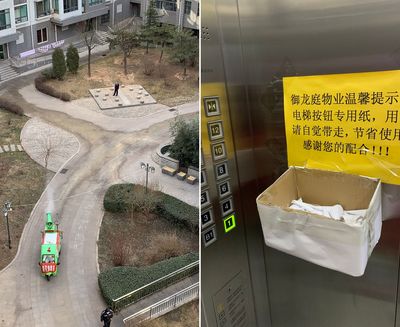Top Tips For Dealing with the Recent Pandemic as a Foreign English Teacher in China

I have been working in China as an English teacher almost for half a year. When the outbreak began, I decided to stay in China. At first, I thought it would be like a seasonal flu quarantine back in my country, Ukraine, when schools are closed for just a week or two. However, the situation got worse and I realized that it might be safer to stay inside my city than to go through the train stations and airports.
Table of Contents
Our life here has changed completely in less than in 48 hours.
I have to say, the way people here react to the situation amazes me.
Adapting school curriculum and lesson plan
2. Wake up at the same time even if you don't have work to do.
4. Think about your shopping time.
Start teaching English online or abroad!
Our life here has changed completely in less than in 48 hours.
Shops gave no signs of opening after the New Year, busses were just passing by the stops on their way to the bus park, communities were closed for the non-residents, in one day you got more temperature checks that in a few months. Every movement has been noted down from the moment I left my community until I got my final temperature check and was allowed to enter back. Wearing a mask has become something as natural as wearing a coat in winter or taking your umbrella on a rainy day. Except buying a mask has turned into a quest along with a price increase by several times. However, I haven't seen people with no masks for weeks, moreover, with no mask on it's more likely that your way into the supermarket or bakery would be closed. Another thing is that everyone who came outside of the town will be placed under the quarantine for 14 days, so it's better to make sure you have your friends or colleagues ready to provide you with your favorite cookies.

I have to say, the way people here react to the situation amazes me.
Despite all the small shops, malls, entertaining centers (gyms, swimming pools...) and public transport being out of service since the end of Chinese New Year, I can see people cheering up one another. On the official website of our city, they post articles about our citizens on the front-line in Wuhan with praises and grateful comments. Many activities went online one by one, so people can get some parts of their normal life. Advertisements for health care activities are everywhere! You can see posts near the shops and entrances to the buildings, inside the elevators, in messages from local authorities, network providers and of course various groups on WeChat.
Also read: How much can I earn teaching English in China?
Fake News Raises Panic
In my opinion, one of the biggest problems is fake news and "aggregated information" that raises panic. Most of the messages I got from my friends and relatives had such questions as "Will you be evacuated?", "Do you have enough food?" and "Why aren't you going back?" based on the news they saw about the situation in Wuhan. To start with, I live in Shanxi province, which had less than 140 cases. During this whole time, I have never experienced a shortage of food supplies in supermarkets, even in fresh vegetables and fruits. Of course, masks and sanitizers became much more expensive and difficult to buy.
Schools are shut down.
All education establishments have been also closed for the indefinite time. Moreover, kindergartens and private schools will open last, so it seems at least until April I'm not going to get to work properly. I am an English teacher at the private school, which started online classes around 3 weeks ago (only local teachers), but they are still a bit messy with some network problems or enrollment difficulties. Here again, I am fascinated with my colleagues. With the first news of the quarantine, they made some activities for kids on WeChat. We took turns on recording daily videos with learning content and tips on how to wash your hands properly or short warmups for kids. Every day students are supposed to send us audio recording with answers, drawings of keywords and occasionally some video presentations of their handicrafts. It's obvious that parents took a great part in all this process, but we are trying to keep kids entertained and motivated to learn.

Adapting school curriculum and lesson plan
Another problem was that we have to quickly create new teaching plans and materials on our own. Everyone expected to get back to work after the New Year holidays, so it's natural that all teaching plans, materials, books, and even personal computers were left at school. Our school is located inside of the Children's educational center, which was reopened only on the 3d of March and only for the stuff. No one was allowed to enter the building for more than a month that affected not only study proses, but our green friends - flowers were left inside. Here I am glad I took a TEFL course and it was rather helpful. I used some tips from the ITTT course and even made worksheets on my own. They turned out quite handy in this situation because they can be easily sent to everyone, collected and checked. Foreign teachers in my school usually have a separate program, which is concentrated not only on teaching language but also on teaching of the 'values'. We aim to create a comfortable atmosphere for kids to encourage them to use more English in an interaction like using 'Thank you', 'You are welcome', 'Can I …, please' and so on. Here again, I got great help from my parents when my lessons started. They provided necessary objects for the lessons, so we could interact with kids almost without screed borders. For example, two kids have apples near them so they easily can have a live conversation, which is a role play, so one can 'give' an apple to another kid.
Before I started to have online classes almost a month passed. After a few days of being locked up at home, I started to feel bored and tired. I got plenty of time on the one hand, but on the other, I had a narrow range of activities to do.
Here are some things that helped me to feel better and even enjoy my time at home.
1. Make a monthly planner.
I am used to having my notepad everywhere with me. It's rather useful to know your lessons and meetings schedule, planned activities and things you have to prepare before the next Monday. However, it turned out useless for a daily routine. Instead, a simple monthly planner has proven to be my savior in this situation. You can pin it on any surface you pass at least a dozen times per day. I simply drew mine and hung it on the fridge. I marked each day with colorful squares for different activities. It got me motivated to fulfill my daily plan so I could put a check in every square.
Also read: Which are the best cities for teaching English in China?
2. Wake up at the same time even if you don't have work to do.
Your 'body clock' can go crazy in such a situation. With no much to do, though, you will find out that you are not tired enough at the end of the day and look, it's 3 am and you are still awake.
3. Fresh air and cleaning.
It's good to have less dust at your apartments anyway. Almost every article about healthcare during the virus outbreak was mentioned the importance of regular cleaning. I marked 'cleanings' on my planner once in two days and it didn't take me much time to keep my home a bit better. Here, in China, to get some fresh air you have to find it first. I have a useful app, AirVisual, on my phone, so I know when it's good to open windows and when it's better to shut them.

4. Think about your shopping time.
As I said before, I didn't face any shortage of food at the supermarkets in our city. Nevertheless, it's still good to avoid lines and mass gatherings at stores, isn't it? I figured out that around lunchtime supermarkets are almost empty during such called 'Chinese siesta" even during the quarantine.
5. Daily exercises.
What do you do when you are at home and a bit bored? Usually, you will grab some snacks while watching serials or reading books. If not, then you are either lying or a superhuman. First places to be closed along with schools and universities due to the quarantine in China were gyms, swimming pools, and sports centers. I know that some of my friends got short videos with some exercises via WeChat, but unfortunately, I wasn't that lucky. Still, I have found some good videos on the Internet and I was motivated to put a check in the 'green' square on my planner.
6. Learn something new.
We always complain that we don't have enough time to learn a new language, to read 'such an interesting, but long book" or to finish knitting a sweater. Here is your perfect chance! Do it now and later it will become your habit. I have been in China for almost half a year, but my Chinese was still below the Basic level. Last month with an app HelloChinese I made significant improvements and I am eager to go on.
How does COVID-19 affect you?
With the improvement of both epidemic situations and weather conditions, I can see more and more people going out and doing some activities inside the community. Of course, everyone has a mask on and not everyone is allowed to leave the community due to the personal schedules, but it's a way to see that life is going on, we will get over it, learn some important lessons and go on.
Start teaching English online or abroad!
Apply now & get certified to teach english abroad!
Speak with an ITTT advisor today to put together your personal plan for teaching English as a foreign language.
Send us an email or call us toll-free at 1-800-490-0531 to speak with an ITTT advisor today.
Related Articles:
- Cultural Sensitivity in the Classroom – Focus on Teaching English To Non-Native Speakers
- 6 Steps To Becoming a More Confident Teacher
- The 7 Biggest Myths About Teaching Abroad Alone as a Woman
- The Benefits of Volunteer English Teaching
- How I Accidentally Discovered My Passion For Teaching And Decided To Make It a Career
- 7 Fun Activities for Teaching Vocabulary in the ESL Classroom



